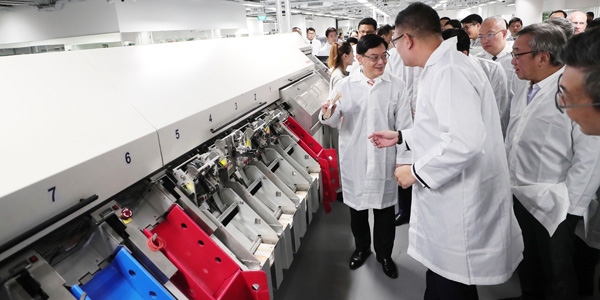INNOVATE
Changi Airport using audio & video analytics for security monitoring
Published on 24 Oct 2018 | By Fabian Koh | Source: Straits Times © Singapore Press Holdings Limited. Permission required for reproduction.
Changi Airport will pilot a Multi-Signal Surveillance Platform which combines audio with video analytics to monitor security incidents.

Finance Minister Heng Swee Keat visiting a cash processing centre at the new Certis Commonwealth building yesterday. ST PHOTO: KELVIN CHNG
The platform- which will start in the middle of next year- will help security officers determine if an alert received is truly a security incident.
For example- apart from the visual element- they can analyse audio data to detect things such as gunshots and bomb blasts.
Finance Minister Heng Swee Keat cited the innovation as an example of an advanced solution in the evolving security climate.
The platform was developed by Certis- the largest private-sector player in Singapore’s security industry- together with partners such as artificial intelligence firm Xjera Labs and Changi Airport Group.
Danger of fake news
The spread of digital technologies has made it easier- cheaper and even profitable to create and spread disinformation. These organised disinformation campaigns can be employed by state actors to harm our national security- divide our communities and erode public trust.
Mr Heng, on the threat from fake news.
Speaking at the launch of the new Certis Commonwealth building yesterday- Mr Heng said Singapore may be one of the safest countries in the world- but it still faces threats from terrorism- in cyber security and from fake news.
Collaborate with A*STAR
Find out more about our Digital TechnologiesHow are other companies using our technologies
In the face of rising and complex security threats- the Government- the security industry and the community must work together to keep Singapore safe and secure.
Finance Minister Heng Swee Keat
Emphasising the need to build new capabilities and stay ahead of the threats- he said cyberspace is a critical area in which security capabilities must be beefed up.
He urged companies to harness technology to face the threats. “As chairman of the National Research Foundation- I have mentioned to our researchers that one of the areas I would like to see more R&D work done is in the security area.”
Evolving methods of attack
In the past- attacks were carried out at prominent locations by trained terrorists working in larger cells. Now- attacks are carried out by self-radicalised lone wolves who can strike anywhere- using ordinary objects like knives and trucks.
Finance Minister Heng Swee Keat, on the evolving methodology of terror attacks.
He said about 27 per cent of the national budget currently goes to security and national defence- and this will continue. He also stressed the role of the security industry – about 47-000 security officers, 600 service providers and 240 security agencies – in supporting the Home Team.
While Singapore is one of the world’s safest cities- according to global rankings such as the 2017 Gallup Global Law and Order Report and 2017 Economist Intelligence Unit Safe Cities Index- it is still vulnerable- said Mr Heng.
There has been a significant increase in the number of self-radicalised individuals arrested here in the past two years- said Mr Heng.
With more assets such as intellectual property and personal data in cyberspace- IT systems have become targets. Fake news is a threat to national security- he added.

Yesterday, Certis also unveiled its new logo and business transformation. Chief executive Paul Chong said: “The new Certis is about Security Plus. This is a new transformational integrated service- with security at its core- combined with facilities management and customer service- underpinned by technology.”
The integration of the services into one platform reflects how the company sees the world transforming- and moving beyond traditional security functions.
Staying ahead of security threats
Ultimately- defending and protecting ourselves against those who wish to harm us is a never-ending responsibility. We must continue to do better and stay ahead of the threats. There are attackers out there who will exploit weaknesses in our processes and systems.
Mr Heng- on the need to constantly be prepared for future security threats.
Was the article helpful?
A*STAR celebrates International Women's Day

From groundbreaking discoveries to cutting-edge research, our researchers are empowering the next generation of female science, technology, engineering and mathematics (STEM) leaders.
Get inspired by our #WomeninSTEM
